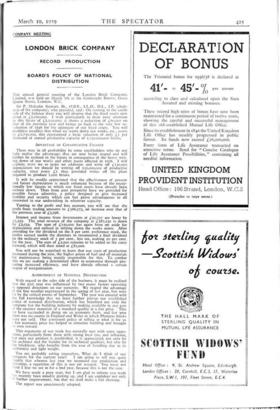COMPANY MEETING
LONDON BRICK COMPANY
RECORD PRODUCTION BOARD'S POLICY OF NATIONAL DISTRIBUTION THE annual general meeting of the London Brick Company, Limited, was held on March 7th at the Connaught Rooms, Great Queen Street, London, W.C.
Sir P. Malcolm Stewart, Bt., 0.B.E., LL.D., D.L., J.P. (chair- man of the company), who presided, said: On turning to the credit side of the balance sheet you will observe that the fixed assets now stand at L2,100,000. I wish particularly to draw your attention to this figure of £2,100,000; it shows a reduction of L60,000 on that of the previous year and brings us back to the very low re- valuation of 1936 for the aggregate of our fixed assets. You will doubtless recollect that when we wrote down our works, etc., assets to £1,750,000, this represented a basic valuation of only Li per thousand of annual productive capacity of r,750,000,000 bricks.
ADVANTAGE OF CONSERVATIVE FINANCE There may in all probability be some stockholders who do not fully realise the advantages that are now being reaped and will further be realised in the future in consequence of the heavy writ- ing down of our works and other assets effected in 1936. I will explain; were we to make no additions and write off £150,000 depreciation we should be writing off 150,000,00o of productive capacity, since every £r thus provided writes off the plant required to produce 1,000 bricks.
It will be readily appreciated that the effectiveness of present and future depreciation is much enhanced because of the excep- tionally low figures to which our fixed assets have already been written down. Thus from past prosperity have we provided for possible future adversity, a policy designed to give increased stability and security which can but prove advantageous to all interested in our undertaking in whatever capacity.
Turning to the profit and loss account, you will see that the profit from trading amounts to £566,575, an increase over that of the previous year of £3,098.
Interest and income from investments at £20,337 are lower by 45,503. The total revenue of the company at £587,130 is down by £2,524. The sum of £150,000 has again been set aside for depreciation and utilised in writing down the works assets. After providing for the dividend on the 8 per cent, preference stock, the profits earned enable the directors to recommend a final dividend on the ordinary stock of 5 per cent., less tax making 20 per cent. for the year. The sum of E2,000 remains to 13e added to the carry forward, which will then stand at £82,000.
You will not be surprised to learn that our costs of production increased during the year, the higher prices of fuel and all materials for maintenance being mainly responsible for this. To combat this we are making a determined effort to economise through pro- curing increased efficiency, and have already effected a certain degree of reorganisation.
ACHIEVEMENT OF NATIONAL DISTRIBUTION With regard to the sales side of the business, it must be realised that the past year was influenced by two major factors operating in opposed directions on our turnover. We reaped the advantage of the fine weather experienced in the spring of last year, but were hit by the critical events of September. The year was entered with the full knowledge that we must further pursue our established policy of national distribution, which has benefited not only the company but the building industry by making available in any part of the country materials of a standard quality at a fair price. This we have succeeded in doing on an economic basis, and last year there was no county in England and Wales in which Phorpres bricks were not sold. Our consistent policy of selling at what is for us a fair economic price has helped to stimulate building and brought is own reward.
This expansion of our trade has naturally met with some oppo- sition, particularly from those with strong local ties, and influence, but once our product is established, it is appreciated, not only by the architect and the builder for its technical qualities, but also by the bricklayer, who benefits from the ease of handling due to its uniformity and light weight.
You are probably asking yourselves, What do I think of our prospects for the current year? I am going to tell you quite rankly that whereas last year we increased our production and lelweries, a repetition of this is not yet assured. You must not • runk I fear we are in for a bad year, because this is not the case.
We have made a poor start, but I am glad to inform you trade nas recently been steadily picking up, and I am confident not only of further improvement, but that we shall make a fair showing.
The report was unanimously adopted.










































 Previous page
Previous page